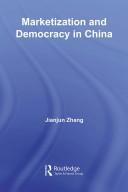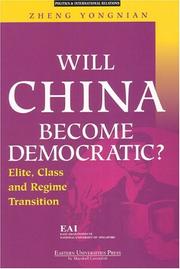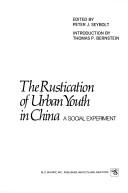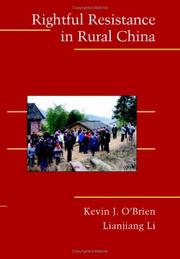| Listing 1 - 10 of 13 | << page >> |
Sort by
|
Book
ISBN: 2267003384 9782267003383 Year: 1983 Volume: 70 Publisher: Paris C. Bourgois
Abstract | Keywords | Export | Availability | Bookmark
 Loading...
Loading...Choose an application
- Reference Manager
- EndNote
- RefWorks (Direct export to RefWorks)
Book
ISBN: 2070716503 9782070716500 Year: 1989 Publisher: Paris: Gallimard,
Abstract | Keywords | Export | Availability | Bookmark
 Loading...
Loading...Choose an application
- Reference Manager
- EndNote
- RefWorks (Direct export to RefWorks)
Journalists --- Press and politics --- Journalistes --- Presse et politique --- Biography --- Biographies --- Liu Binyan --- China --- Chine --- Politics and government --- Politique et gouvernement --- S11/0709 --- S06/0221 --- S06/0261 --- China: Social sciences--Cadres (incl. political commissars) --- China: Politics and government--People's Republic: central government --- China: Politics and government--Class conflict

ISBN: 0415322340 0203300033 9780203300039 9786610051175 6610051178 9780415322348 9781134353613 1134353618 9781134353569 1134353561 9781134353606 113435360X 1280051175 9781280051173 Year: 2004 Publisher: London New York RoutledgeCurzon
Abstract | Keywords | Export | Availability | Bookmark
 Loading...
Loading...Choose an application
- Reference Manager
- EndNote
- RefWorks (Direct export to RefWorks)
Communist leadership --- Elite (Social sciences) --- Political leadership --- S06/0220 --- S06/0405 --- S10/0330 --- S11/0534 --- S11/0708 --- S11/0709 --- China: Politics and government--People's Republic: general --- China: Politics and government--CCP, history and ideology: general --- China: Economics, industry and commerce--Employment --- China: Social sciences--Class studies --- China: Social sciences--Elite --- China: Social sciences--Cadres (incl. political commissars) --- China --- Politics and government
Book
ISBN: 0295961465 Year: 1984 Publisher: Seattle
Abstract | Keywords | Export | Availability | Bookmark
 Loading...
Loading...Choose an application
- Reference Manager
- EndNote
- RefWorks (Direct export to RefWorks)
Authors, Chinese --- #SML: Joseph Spae --- S05/0221 --- S06/0437 --- S06/1000 --- S11/0709 --- Biography --- China: Biographies and memoirs--20th century: individuals --- China: Politics and government--Policy towards intellectuals (incl. "thought reform", "brainwashing") --- China: Politics and government--Political campaigns --- China: Social sciences--Cadres (incl. political commissars) --- Yang, Chiang, --- Chinese literature --- Yang Jiang

ISBN: 0203683188 1280037350 9786610037353 0203390601 9780203390603 9780415327572 0415327571 0415327571 9781134337309 1134337302 9781134337255 1134337256 9781134337293 1134337299 9780415648813 0415648815 9780203683187 9781280037351 6610037353 Year: 2004 Publisher: London New York RoutledgeCurzon
Abstract | Keywords | Export | Availability | Bookmark
 Loading...
Loading...Choose an application
- Reference Manager
- EndNote
- RefWorks (Direct export to RefWorks)
China's Scientific Elite is a study of those scientists holding China's highest academic honour - membership of the Chinese Academy of Sciences. Having carried out extensive systematic data collection of CAS members Cao examines the social stratification system of the Chinese science community and the way in which politics and political interference has effected the stratification. The book then goes on to compare the Chinese system to the stratification of the US scientific elite. The conclusions are fascinating, not least because one national elite resides in a democratic liberal so
Science --- Scientists --- Elite (Social sciences) --- Social aspects --- China --- Intellectual life --- S11/0708 --- S11/0709 --- S14/0450 --- S19/0130 --- S19/0140 --- China: Social sciences--Elite --- China: Social sciences--Cadres (incl. political commissars) --- China: Education--Contemporary education since 1949 --- China: Natural sciences--General works --- China: Natural sciences--History of sciences

ISBN: 1134055692 1281259640 9786611259648 0203931181 9780203931189 9780415452229 0415452228 9781134055647 9781134055685 9781134055692 9780415574280 Year: 2008 Publisher: New York Routledge
Abstract | Keywords | Export | Availability | Bookmark
 Loading...
Loading...Choose an application
- Reference Manager
- EndNote
- RefWorks (Direct export to RefWorks)
Since China began an era of market reform three decades ago, many Westerners believed that, political liberalization and, eventually, democracy would follow. However, contrary to Western expectations, China remains an authoritarian country and the communist party is still in power, even though the country has witnessed rapid economic growth and its people have become richer.In Marketization and Democracy in China, Jianjun Zhang questions whether China's market reforms have created favorable social conditions for democracy, whether the country's emerging entrepreneurial class w
Democracy --- China --- Social conditions --- Economic policy --- S06/0225 --- S10/0583 --- S10/0585 --- S11/0534 --- S11/0708 --- S11/0709 --- China: Politics and government--People's Republic: local and provincial government: since 1976 --- China: Economics, industry and commerce--Management of private enterprises --- China: Economics, industry and commerce--Marketing (including consumption) --- China: Social sciences--Class studies --- China: Social sciences--Elite --- China: Social sciences--Cadres (incl. political commissars)

ISBN: 9812103538 Year: 2004 Publisher: Singapore Eastern universities press.
Abstract | Keywords | Export | Availability | Bookmark
 Loading...
Loading...Choose an application
- Reference Manager
- EndNote
- RefWorks (Direct export to RefWorks)
S06/0500 --- S06/0223 --- S06/0424 --- S11/0534 --- S11/0708 --- S11/0709 --- China: Politics and government--Other modern political movements (e.g. anarchism, Socialism, dissident movements, Beijing Spring, Tian'anmen) --- China: Politics and government--People's Republic: general: since 1976 --- China: Politics and government--CCP: since 1989 --- China: Social sciences--Class studies --- China: Social sciences--Elite --- China: Social sciences--Cadres (incl. political commissars) --- Democracy --- Democratization --- China --- Politics and government.

ISBN: 0873320824 Year: 1977 Publisher: White Plains Sharpe
Abstract | Keywords | Export | Availability | Bookmark
 Loading...
Loading...Choose an application
- Reference Manager
- EndNote
- RefWorks (Direct export to RefWorks)
Youth --- Jeunesse --- China --- Chine --- Intellectual life --- Vie intellectuelle --- S06/1058 --- S11/0709 --- S11/0731 --- -Youth --- -#SML: Joseph Spae --- Young people --- Young persons --- Youngsters --- Youths --- Age groups --- Life cycle, Human --- China: Politics and government--Xiafang (sending down to the villages) --- China: Social sciences--Cadres (incl. political commissars) --- China: Social sciences--Childhood, youth --- Addresses, essays, lectures --- -Addresses, essays, lectures. --- Intellectual life. --- Forced migration --- Urban-rural migration --- #SML: Joseph Spae --- Cities and towns, Movement from --- City-country migration --- Counterurbanization --- Migration, Urban-rural --- Urban exodus --- Cleansing, Ethnic --- Compulsory resettlement --- Ethnic cleansing --- Ethnic purification --- Involuntary resettlement --- Migration, Forced --- Purification, Ethnic --- Relocation, Forced --- Resettlement, Involuntary --- Migration, Internal --- Rural-urban relations

ISBN: 0521678528 0521861314 9780521861311 9780521678520 9780511791086 0511161611 9780511161612 0511791089 9780511160882 0511160887 0511191685 9780511191688 1107156491 1280458224 0511160313 0511312555 9780511312557 Year: 2006 Publisher: Cambridge New York Cambridge University Press
Abstract | Keywords | Export | Availability | Bookmark
 Loading...
Loading...Choose an application
- Reference Manager
- EndNote
- RefWorks (Direct export to RefWorks)
How can the poor and weak 'work' a political system to their advantage? Drawing mainly on interviews and surveys in rural China, Kevin O'Brien and Lianjiang Li show that popular action often hinges on locating and exploiting divisions within the state. Otherwise powerless people use the rhetoric and commitments of the central government to try to fight misconduct by local officials, open up clogged channels of participation, and push back the frontiers of the permissible. This 'rightful resistance' has far-reaching implications for our understanding of contentious politics. As O'Brien and Li explore the origins, dynamics, and consequences of rightful resistance, they highlight similarities between collective action in places as varied as China, the former East Germany, and the United States, while suggesting how Chinese experiences speak to issues such as opportunities to protest, claims radicalization, tactical innovation, and the outcomes of contention.
Peasants --- Paysannerie --- Political activity --- Activité politique --- China --- Chine --- Rural conditions. --- Conditions rurales --- S11/0485 --- S11/0709 --- S11/0920 --- S11/0534 --- S06/0225 --- S06/0262 --- S06/0500 --- #SBIB:328H52 --- #SBIB:324H73 --- China: Social sciences--Rural change --- China: Social sciences--Cadres (incl. political commissars) --- China: Social sciences--Corruption --- China: Social sciences--Class studies --- China: Politics and government--People's Republic: local and provincial government: since 1976 --- China: Politics and government--Mass line, mass criticism --- China: Politics and government--Other modern political movements (e.g. anarchism, Socialism, dissident movements, Beijing Spring, Tian'anmen) --- Instellingen en beleid: China --- Politieke verandering: oppositie en minderheid, protest, politiek geweld --- Activité politique --- Peasantry --- Agricultural laborers --- Rural population --- Marks (Medieval land tenure) --- Villeinage --- Social Sciences --- Political Science --- Actualité politique --- Situation rurale --- Political activity.
Book
ISBN: 9780521199902 0521199905 9780511691737 9781107547698 9780511691157 0511691157 0511691734 9780511690419 051169041X 1107205743 0511849419 1107547695 128263707X 9786612637070 0511689675 0511692277 051168892X Year: 2009 Publisher: Cambridge : Cambridge University Press,
Abstract | Keywords | Export | Availability | Bookmark
 Loading...
Loading...Choose an application
- Reference Manager
- EndNote
- RefWorks (Direct export to RefWorks)
"Has China become just another capitalist country in a socialist cloak? Will the Chinese Communist Party's rule survive the next ten years of modernization and globalization? Frank Pieke investigates these conundrums in this fascinating account of how government officials are trained for placement in the Chinese Communist Party. Through in-depth interviews with staff members and aspiring trainees, he shows that while the Chinese Communist Party has undergone a radical transformation since the revolutionary years under Mao, it is still incumbent upon cadres, who are selected through a highly rigorous process, to be ideologically and politically committed to the party. It is the lessons learnt through their teachers that shape the political and economic decisions they will make in power. The book offers unique insights into the structure and the ideological culture of the Chinese government, and how it has reinvented itself over the last three decades as a neo-socialist state"--Provided by publisher.
Communism --- Communist education --- Zhongguo gong chan dang --- China --- Politics and government --- Zhongguo gong chan dang. --- S11/0708 --- S11/0709 --- S06/0424 --- S14/0454 --- China: Social sciences--Elite --- China: Social sciences--Cadres (incl. political commissars) --- China: Politics and government--CCP: since 1989 --- China: Education--Education: since 1989 --- Parti communiste chinois. --- Zhong guo gong chan dang --- Chung-kuo kung chʻan tang --- Chūgoku Kyōsantō --- Chungguk Kongsandang --- 中国共产党 --- 中國共產黨 --- КПК --- KPK --- Komunistická strana Číny --- Komunistička partija Kine --- Communist Party of China --- Chinese Communist Party --- Communist Party (China) --- Gong chan dang (China) --- 共产党 (China) --- Коммунистическая партия Китая --- Kommunisticheskai︠a︡ partii︠a︡ Kitai︠a︡ --- Shina Kyōsantō --- Китайска комунистическа партия --- Kitaĭska komunisticheska partii︠a︡ --- Partido Comunista de China --- PCCh --- Parti communiste chinois --- CCP --- Partito comunista cinese --- KPCh --- Kommunistische Partei Chinas --- К.П.К. --- K.P.K. --- CPC --- C.C.P. --- Partia Komuniste të Kinës --- Đảng cộng sản Trung quốc --- Zhong gong --- 中共 --- Pcc --- P.C. Chino --- ХКН --- KhKN --- Хятадын Коммунист нам --- Khi︠a︡tadyn Kommunist nam --- Communism - China --- Communist education - China --- China - Politics and government - 1976-2002 --- Social Sciences --- Political Science --- Communisme --- Éducation communiste --- Chine --- 1976-.... --- Politique et gouvernement --- 1997-....
| Listing 1 - 10 of 13 | << page >> |
Sort by
|

 Search
Search Feedback
Feedback About UniCat
About UniCat  Help
Help News
News